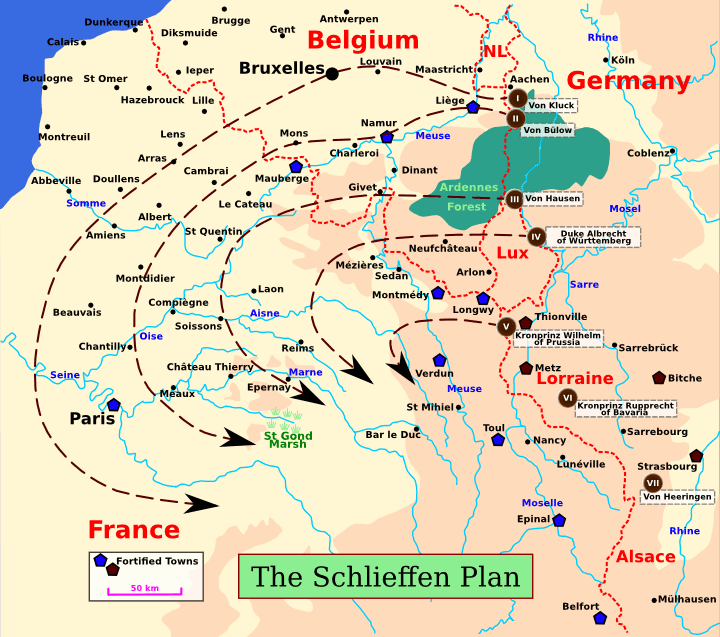
The German empire
Map of the german empire


Germany fact sheet
Prussia formed the German Empire in 1871 after defeating the French in the Franco - Prussian war of 1870 to 1871.
4 kingdoms in the empire - Prussia, Bavaria, Württemberg and Saxony
Numerous colonies in Africa and Oceania, as well as the port of Qingdao

Germany before ww1
The German Empire under the Kaiser Wilhelm II was undisputedly a great power in Europe and upsetted the balance of power
-
Germany had rapidly industrialised after her unification, turning a predominantly agricultural economy into a pre-eminent industrial power as well as skyrocketing the production of coal, iron and steel.
-
Germany also had an excellent education system which resulted in almost universal literacy. This created a constant stream of experts in all academic skills, creating an exceptionally lively scientific, literary and artistic community.
-
The German army had highly trained officers who inculcated a common doctrine into units and trained them to the highest standards. Germany also had an extensive conscription system where men would only be freed from their military obligation to the state at 45 years old. This created a huge, well trained reserve that could massively expand the size of the army during war time.
-
However, the German form of government was very undemocratic and a lot of power still rested with the Kaiser rather than the democratically elected Reichstag.
Germany's diplomacy
The League of the Three Emperors between Austria-Hungary, Russia and Germany was formed in 1873 but this fell through due to Austrian and Russian disagreements in the Balkans
Germany secured the Dual Alliance with Austria - Hungary in 1879 (Zweibund) and the Triple Alliance with Italy in 1882. Italy was not a very reliable ally though as Italy desired some Austrian land, most notable the port of Trieste.

Kaiser Wilhelm II
-
Ascended the throne in 1888
-
He had an aggressive foreign policy and was concerned with the possibility of new territorial gains and becoming a leading voice on the world stage
-
He also made decision with his emotions and impulse rather than developing a consistent and mature policy
-
The Kaiser alienated the British by seeking "Weltpolitik", seeking to expand Germany's political and economic spheres of influence, as well as trying to expand the German High Seas Fleet to match the British
-
He also alienated Germany's only reliable ally, Austria by making brash remarks like "How I love the German part of your empire. I can't wait until the rest collapses and the Reich can absorb it"
-
Hence, the Kaiser was responsible for the foreign policy decisions that aligned Germany against Britain and fuelled the flames of war

The war in the west
Germany invaded Luxembourg on August 2th, Belgium and France on the 3rd and was at war with Britain on the 4th.
Germany enacted the modified Schieffen Plan where a majority of German troops would invade Belgium and sweep past the less fortified Franco-Belgian border.
The plan went well as the Germans were able to use their developed railway system to quickly transport troops. The German army station is Alsace was able to defeat the French invasion and drive them back across the border. However, the German army stalled in Belgium for longer than expected, resulting in the German army being unable to reach Paris.
The Germans lost the battle of the Marne and could not advance on Paris, they retreated to the Aisne river and dug in.
The trench lines were then dug and extended from the Swiss Border to the English channel and stretched through much of Northern France and Belgium.
The Germans were able to quickly react to the new trench warfare, utilising mortars , grenades, howitzers and machine guns to great effect.
However, the Germans were unable to take the Ypres Sailient in Belgium which was held by the British.
The war would become a bloody stalemate in the west with new horrors brought to the table like Chlorine Gas, first developed by Germany.
In 1916 Germany targeted the ancient city of Verdun because it had been one of the last cities to hold out against the German Army in 1870, and one of great French national pride. Germany expected that with proper tactics, French losses would be greater than those of the Germans and that continued French commitment of troops to Verdun would "bleed the French Army white" and then allow the German army to take France easily.
The Battle of Verdun began, with the French positions under constant shelling and poison gas attack and taking large casualties under the assault of overwhelmingly large German forces. However, not only did the Germans fail to take Verdun, they suffered just as much casualities as the French and were forced to retreat in December.


War in the east
Germany declares war on Russia on 1st August
The war begins badly for the Germans first as East Prussia and Galicia (Austrian Poland) were invaded. The Germans however were able to turn around and deliver the Russians a smashing defeat at the battle of Tannenberg, making General Paul Von Hindenburg a living legend and driving the Russians put of East Prussia
The Austrians were getting battered by the Russians so Germany had to send relief to help plug the Austrian lines.
In 1915, the German high command decided to make its main effort on the Eastern Front, and accordingly transferred considerable forces there. Austrian and German troops were put under unified German command and the successful Gorlice-Tarnow offensive drove the Russians out of Russian Poland.
